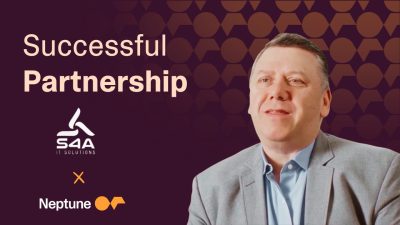


Suits Blog: Clean Core, Without Compromise: A CPO’s Perspective on Navigating SAP Cloud Transformation and the Future of AI.
By Helder Gonçalves, Chief Product Officer, Neptune Software
SAP enterprises are under pressure to modernize fast—without losing control. The key is a Clean Core SAP transformation. By keeping systems lean and upgrade-safe, CIOs can embrace cloud, prepare for AI-driven innovation, and enable low-code modernization without compromise.
“How do we move forward without losing the custom developments that make our business what it is?”
It’s a fair question. And one that sits at the heart of SAP’s Clean Core vision: keep the ERP lean, push innovations outside the core, and build agility into the system from the start.
But modernizing your SAP environment isn’t just about where code lives. Increasingly, it’s also about what your applications are capable of. And in 2025 and beyond, that means looking at AI-readiness right alongside Clean Core compliance.
Let’s talk about both.
Clean Core in Practice: The Real-World Challenge
SAP’s Clean Core approach is designed to help customers reduce complexity by avoiding in-core customizations. This makes future upgrades smoother and aligns with the shift to cloud-based ERP systems like S/4HANA Cloud and RISE with SAP.
The vision is clear. But the journey often isn’t.
Most companies still rely on highly customized ECC or S/4HANA systems. Their business-critical processes are intertwined with ABAP logic that’s hard to replace. Meanwhile, SAP’s cloud-first tools (BTP, RAP, CAP, Build) require new skills, new governance models, and in many cases—a leap of faith.
This leaves many SAP customers caught in the middle: needing to modernize, but unsure how to move forward without risking what works.
Bridging Old and New: Neptune’s Role
At Neptune, we designed our platform to sit at the intersection of stability and innovation. It’s a way for enterprises to:
- Preserve what they’ve already built
- Move toward Clean Core principles at their own pace
- And prepare for next-generation capabilities like AI, without replatforming everything
Let’s break that down.
Dual Deployment, Built for Evolution
You can start with in-stack applications on ECC or S/4HANA—leveraging your current ABAP logic, Fiori apps, and SAP skills. Then, when you’re ready, migrate those apps to side-by-side cloud infrastructure using Neptune Open Edition.
Same logic, same experience, Clean Core-compliant.
This staged approach is especially valuable for organizations doing phased S/4HANA migrations or those working with hybrid landscapes.
Reuse, Don’t Rebuild
Clean Core doesn’t have to mean starting from scratch. Neptune helps you:
- Reuse existing ABAP code through OData services or REST APIs
- Build modern apps with low-code tools—without breaking SAP alignment
- Extend SAP functionality without disrupting the upgrade path
You don’t have to choose between technical debt and innovation. You can address both—strategically.
Preparing for AI, Without the Hype
Now, here’s where the conversation evolves. Clean Core isn’t just about where code runs—it’s about what your architecture enables in the future.
And the future is undeniably AI-driven.
In my view, AI should not be treated as a separate track or an experimental pilot in a silo. Instead, it should be a natural evolution of your existing enterprise applications.
At Neptune, we’re enabling just that: a Clean Core foundation that’s ready to embed applied enterprise AI wherever it creates business value.
Whether it’s:
- A smart assistant inside a sales app
- Natural language interfaces for field workers
- Automated workflows triggered by data signals
AI should live inside the tools your people already use—not off in a lab.
And when your application layer is flexible, decoupled, and API-driven (as it is with Neptune), that integration becomes not only possible, but practical.
Why Clean Core + AI Matters Together
Let me be clear: you can’t harness the full power of enterprise AI if your core system is bogged down by legacy custom code, siloed processes, and outdated UI.
Clean Core is what gives you the agility to build smarter, AI-augmented workflows. And platforms like Neptune give you the flexibility to do it without technical reinvention.
AI is only valuable when it’s grounded in your data, your workflows, and your governance standards. Our Applied AI approach ensures that what you deploy is:
- Scalable
- Governable
- LLM-agnostic
- And above all, useful
So while Clean Core prepares you for upgrades, AI-readiness prepares you for the next generation of productivity and decision-making.
You need both.
What You Can Do Today
If you’re starting your transformation journey—or trying to course-correct—it doesn’t need to be a complete overhaul. Here’s where I’d focus first:
1. Identify Legacy Extensions That Block Agility
What processes or custom apps currently tie you to the core? Which ones could be candidates for low-code modernization?
2. Start Decoupling with Strategic Quick Wins
Internal tools like mobile dashboards or lightweight field apps are a great place to start. They deliver visible value and are easy to migrate when the time comes.
3. Assess AI Opportunities in Your Workflows
Where could goal-oriented assistants or smart automation reduce manual work? Start small, but ensure your platform allows for scaling.
The Road Ahead
Clean Core is no longer optional—it’s the path SAP is charting for all of us. But that doesn’t mean you have to sacrifice everything you’ve built or delay innovation until your migration is complete.
You can move forward strategically, protect business-critical processes, and create space for AI-driven innovation along the way.
That’s exactly what we’ve built Neptune to support:
- A bridge between legacy and cloud
- A platform that respects the value of what you’ve already built
- And an environment that’s future-ready for what’s next
5 Key Take-Aways
- Clean Core is the enabler—not the end goal: Keeping the ERP lean creates the agility you need to layer on innovation like AI and future-proof upgrades.
- Modernize at your own pace: A dual-deployment model lets you start in-stack on ECC/S/4HANA and later move side-by-side—re-using the same logic and Fiori UX while staying Clean-Core compliant.
- Reuse, don’t rebuild: Expose existing ABAP via OData/REST and wrap it with low-code tools so you can slash technical debt without starting from scratch.
- AI belongs inside everyday workflows: Smart assistants, natural-language UIs, and data-driven automations should live in the apps employees already use—not in isolated “innovation labs.”
- Clean Core + AI-readiness is a single strategy: You can’t unlock enterprise AI if legacy custom code clogs your core—so tackle both modernization and AI enablement together.
“Clean Core is what gives you the agility to build smarter, AI-augmented workflows — and platforms like Neptune give you the flexibility to do it without technical reinvention.”
— Helder Gonçalves, Chief Product Officer, Neptune Software



